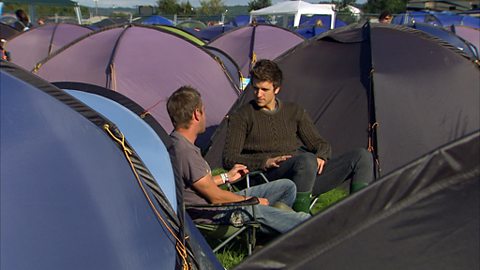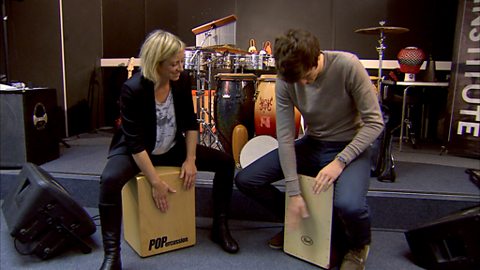We Brits love nothing more than a weekend of music, mayhem, and mud. Festivals have become so popular that now over 400 take place every year. Reading is the oldest and attracts some of the world's biggest names. But Reading is more than just a bit of fun - it's a business. And for the 200 or so companies that provide bottles of water and wacky sunglasses, it's an opportunity to make a lot of money. Though they make the festival experience better, it's important to know the companies are not all run the same.
To find out more, I'm heading somewhere pretty special - backstage. I'm meeting a man who provides something you can't see or touch but without which there definitely wouldn't be any music at all. Rob Hutchinson owns Innovation Power, which provides all the electricity needed to run everything from the stage lights to the guitars.
This is the main stage supply, so there's not just one big supply to the stage. There's several supplies. There's the sound, the lights, the video.
Not like plugging your hoover in, is it?
No, not at all.
So what would happen if I switched off one of these? I'm itching to in a way, can I do something?
Those people out there would get very angry.
Really?
Yeah. I'd be running off in that direction.
Supplying power to Reading isn't straightforward. Neither is Rob's company structure. That's because, with an average annual turnover of £1.5 million, Rob decided to make Innovation Power a Private Limited Company. It's quite different to being a franchise or a sole trader. One of the main differences is that an owner like Rob has a separate legal identity from his business. That gives the business what's called limited liability, which means should it go bust, bosses like Rob would only lose the money invested rather than their personal wealth. Also, in terms of structure, a limited company needs at least one shareholder. The more shares you own, the more control you have of the company.
We started in the '80s as a sole trader stroke partnership. In the '90s we got busier. We were picking up bigger and bigger events. I said to the accountant, "If something went wrong, what's going to happen?" He said, "Well, they might sue you!" As you grow, you need to protect what you've worked for, and if you're not limited, you know, if you've not got that suit of armour on, you're going to lose everything. You'll be out on the street in your shirt tails!
What are the disadvantages of a private limited company? Red tape, it's always red tape. Your finances are more complicated and your accounts are published. People can go to Companies House, electronically download, have a look at your accounts and see if you're viable. You're open to scrutiny.
That's all pretty straightforward so far, right? However, there's one more important thing to know when discussing companies. There's actually more than one type of limited company. Limited companies can either be private limited companies, like Rob's, or public limited companies. Most of the ones around the festival site are private. It's all to do with who owns them. All companies are owned by a group of people known as shareholders. In a private limited company, people can only buy shares if they're invited to do so by the main shareholder. You can tell if a company is private because it will have the letters LTD after its name. But in a public limited company, anyone can buy shares which are openly traded on a stock exchange. So it's a good way of increasing investment and expanding quickly. These companies have PLC after their name. There are around 9,000 PLCs in Britain, and many of them are household names.
One of those is Future PLC, publisher of some of the world's most popular music magazines. With over 200 shareholders and multi-million pound profits, it dwarfs Innovation Power. Stevie Spring is the boss.
The main advantages of being a PLC are access to different lines of cash. So instead of just being able to go to the bank, we can go to our shareholders and get extra money to expand, to grow the business.
It might be a good way of expanding, but becoming a PLC involves even more transparency than private limited companies.
Everything from my salary to how much profit we make to any company that we might be thinking of buying has to be announced to the public so that everybody who is buying or selling shares is doing it with the same information base.
So companies aren't as straightforward as you might think. They come in all shapes and sizes, from private limited companies to PLCs. But they all have one thing in common, and that is to make cash, whether that's for two shareholders or a thousand.
Video summary
A collection of short films hosted by Radio 1 DJ Greg James which look at how business concepts work at a music festival.
The films explores four important themes:
- Entrepreneurship
- Sole trading
- Franchises
- Companies
These clips are taken from the original BBC series, Music, Mud and Making Money
Suitable for: KS4 / GCSE in England, Wales and Northern Ireland and National 5 in Scotland.
Teacher Notes
Use to clarify differences in company structure.
Ask students to investigate local Private Limited Companies and Public Limited Companies: what are the key differences in terms of size, growth and profits?
This clip will be relevant for teaching Business at KS4/GCSE, in England and Wales and Northern Ireland
Also at National 5 in Scotland.
This topic appears in OCR, Edexcel, AQA, WJEC, CCEA GCSE and SQA.
How to be an entrepreneur. video
A look at how festival businesses can bring out the best in entrepreneurs.

What is a franchise? video
Looking at the franchisor and franchisee model of business growth.

What’s it like being a sole trader? video
A detailed look at why people go it alone in business and set up as a sole trader.

External learning-related websites:
- Students and teachers over the age of 16 can create a free Financial Times account. For a Financial Times article about partnerships in business from 2009, click here.
- LifeSkills - Putting enterprise skills into action - Teaching resources and activities on developing an enterprising mindset (Free registration required.)
- LifeSkills - Steps to starting a business - Introduction to enterprise skills (Free registration required.)